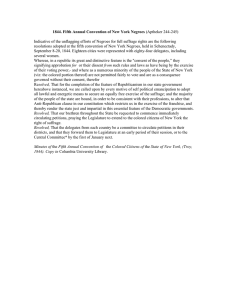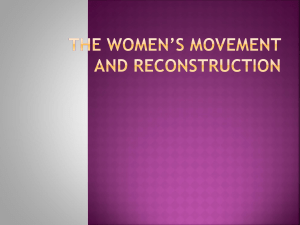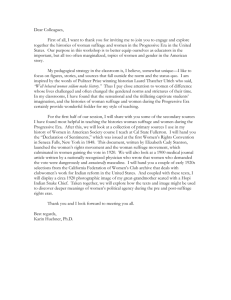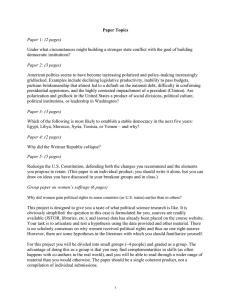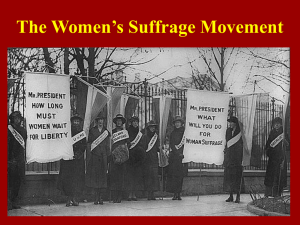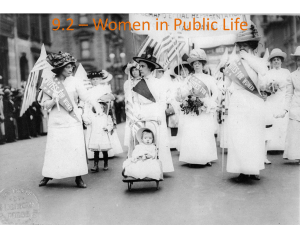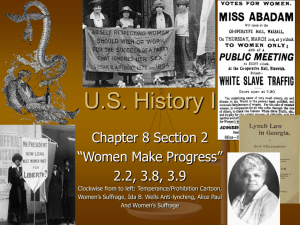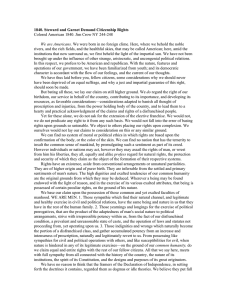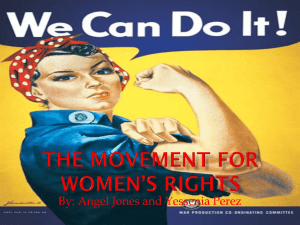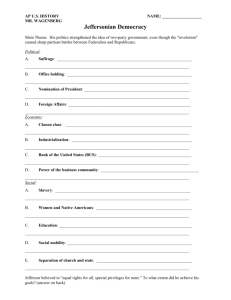1846. Debating Suffrage NYS 1846 Convention (Jim Crow NY, 250-252) 1846 Convention.
advertisement
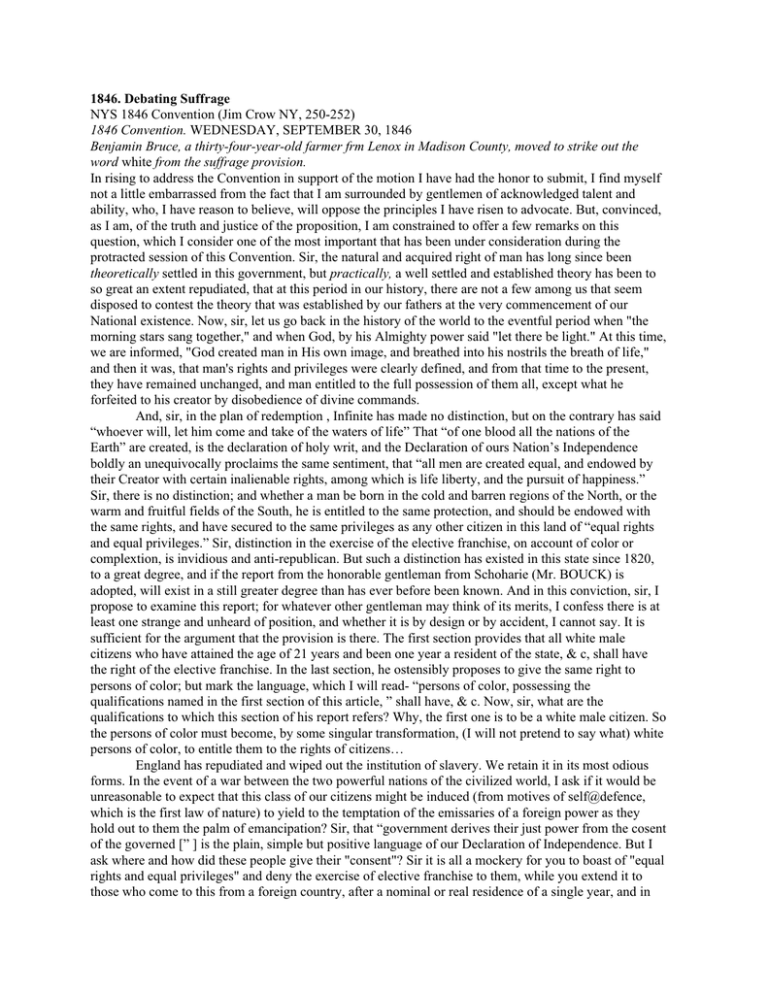
1846. Debating Suffrage NYS 1846 Convention (Jim Crow NY, 250-252) 1846 Convention. WEDNESDAY, SEPTEMBER 30, 1846 Benjamin Bruce, a thirty-four-year-old farmer frm Lenox in Madison County, moved to strike out the word white from the suffrage provision. In rising to address the Convention in support of the motion I have had the honor to submit, I find myself not a little embarrassed from the fact that I am surrounded by gentlemen of acknowledged talent and ability, who, I have reason to believe, will oppose the principles I have risen to advocate. But, convinced, as I am, of the truth and justice of the proposition, I am constrained to offer a few remarks on this question, which I consider one of the most important that has been under consideration during the protracted session of this Convention. Sir, the natural and acquired right of man has long since been theoretically settled in this government, but practically, a well settled and established theory has been to so great an extent repudiated, that at this period in our history, there are not a few among us that seem disposed to contest the theory that was established by our fathers at the very commencement of our National existence. Now, sir, let us go back in the history of the world to the eventful period when "the morning stars sang together," and when God, by his Almighty power said "let there be light." At this time, we are informed, "God created man in His own image, and breathed into his nostrils the breath of life," and then it was, that man's rights and privileges were clearly defined, and from that time to the present, they have remained unchanged, and man entitled to the full possession of them all, except what he forfeited to his creator by disobedience of divine commands. And, sir, in the plan of redemption , Infinite has made no distinction, but on the contrary has said “whoever will, let him come and take of the waters of life” That “of one blood all the nations of the Earth” are created, is the declaration of holy writ, and the Declaration of ours Nation’s Independence boldly an unequivocally proclaims the same sentiment, that “all men are created equal, and endowed by their Creator with certain inalienable rights, among which is life liberty, and the pursuit of happiness.” Sir, there is no distinction; and whether a man be born in the cold and barren regions of the North, or the warm and fruitful fields of the South, he is entitled to the same protection, and should be endowed with the same rights, and have secured to the same privileges as any other citizen in this land of “equal rights and equal privileges.” Sir, distinction in the exercise of the elective franchise, on account of color or complextion, is invidious and anti-republican. But such a distinction has existed in this state since 1820, to a great degree, and if the report from the honorable gentleman from Schoharie (Mr. BOUCK) is adopted, will exist in a still greater degree than has ever before been known. And in this conviction, sir, I propose to examine this report; for whatever other gentleman may think of its merits, I confess there is at least one strange and unheard of position, and whether it is by design or by accident, I cannot say. It is sufficient for the argument that the provision is there. The first section provides that all white male citizens who have attained the age of 21 years and been one year a resident of the state, & c, shall have the right of the elective franchise. In the last section, he ostensibly proposes to give the same right to persons of color; but mark the language, which I will read- “persons of color, possessing the qualifications named in the first section of this article, ” shall have, & c. Now, sir, what are the qualifications to which this section of his report refers? Why, the first one is to be a white male citizen. So the persons of color must become, by some singular transformation, (I will not pretend to say what) white persons of color, to entitle them to the rights of citizens… England has repudiated and wiped out the institution of slavery. We retain it in its most odious forms. In the event of a war between the two powerful nations of the civilized world, I ask if it would be unreasonable to expect that this class of our citizens might be induced (from motives of self@defence, which is the first law of nature) to yield to the temptation of the emissaries of a foreign power as they hold out to them the palm of emancipation? Sir, that “government derives their just power from the cosent of the governed [” ] is the plain, simple but positive language of our Declaration of Independence. But I ask where and how did these people give their "consent"? Sir it is all a mockery for you to boast of "equal rights and equal privileges" and deny the exercise of elective franchise to them, while you extend it to those who come to this from a foreign country, after a nominal or real residence of a single year, and in many cases a less period. I am one of those sir, who hold the truth to be self evident that "all men are created equal" and would reduce to practice what we all hold most tenaciously in theory. Now if "colored persons" are men then give them the rights and privileges of men, if they are not men, then make them slaves, chatties and things, and let us have no more of this "opposition to slavery" and desire "to benefit the colored man" that is so much tallied in favor and voted against. . . . Mr. Russel 1846 State Convention, Jim Crow NY 252 New Jersey, Pennsylvania, and Ohio, the only states between us and the slave population of the South, will not yield these privileges, because it would invite among them a dangerous proportion of another race of men. But we are told, that New York should extend such invitation, by an offer of equal participation in the government of five-sixths of our own citizens, who cannot exercise the same privilege, and some gentlemen are pleased to take into their own hands, the thunderbolts of Almighty Power, and to wield its vengeance upon all who doubt the justice, or propriety, of extending the numbers of the electoral body, by an infusion of this new class with it. Mr. R. doubted, whether gentlemen had been legitimately ordained as ministers of Divine retribution. Many suspected that their motives, as well as their mission in this cause, were of the earth, earthly—and not of any Divine source, express or implied. Jim Crow NY, 253-255 THURSDAY OCTOBER 1, 1846 John A. Kennedy, a paint dealer from New York City, continued the argument for maintaining the 1821 property qualification. Mr. KENNEDY said, the absence of the chairman of committee No. 4, (Mr. BOUCK,) and two others of its most intelligent members, had devolved on him, in part, the duty of explaining the views which influenced them in presenting the portion of the section under debate. This question had been very fully examined by the committee. Opportunity had been afforded to those who felt an interest in the subject, to lay their views and wishes before it. Among others a delegation from the colored population had appeared, and the same privilege was extended to them. After many meetings, and laborious application, the opinion prevailed in the committee, nearly unanimously, adverse to property qualification for an elector, in any case. The mere possession of property was deemed to be no test of political merit; that the colored man, whether possessed of property or not of a certain kind, and to a certain extent, was entitled to natural rights; and that if political privileges were extended to his race, they should not depend on his possessions, but on his manhood. The possession of property by the white man was no infallible evidence of either intelligence or patriotism. One dependent for his daily bread on his daily toil, might surpass him in both. And there was no good reason for believing that color would make an essential difference in these particulars. This article, therefore, was designedly put in the form in which it was, for the purpose of excluding from our fundamental compact, the last vestige of an odious, cruel and unjust condition for holding office, and exercising suffrage. If the colored man was worthy of being admitted to these privileges, it should be on a principle of perfect equality. He should be either excluded altogether from a participation in government, on account of his race; or admitted into full connexion for the sake of his humanity. The honorable and learned gentleman who occupied the floor yesterday, seemed determined to confuse rights with privileges, in discussing this question; and boldly claimed the elective franchise as a right. In these views he could not concur. Rights were emanations from nature; born with him to whom they belonged, and alienable only for offences against society—and this under all forms of government. But on the contrary, privileges were acquired,—conventionally, or by grant of the governing power. When long possessed, they were sometimes denominated civil rights, but they never became naturalized. In considering a question of this kind, full of abstractions, it was, to say the least, disingenuous to endeavor to confound natural rights with civil franchises. It would not be disputed that civil rights or privileges were the constant subject of mutation, while natural rights were inalienable. Should it be conceded that the elective suffrage is not a franchise, but a natural right, to whom would it belong? and who would be entitled to its exercise? Not male citizens of natural age and diverse colors only. No, sir; natural rights recognized no more distinctions in age or sex, than in color or condition. Nor did they stop with our women and children: but fairly and honestly carried out, would extend the exercise to every human being who might happen to be on our soil on an election day, in the same manner in which they would be entitled to their personal liberty or the enjoyment of life. Gentlemen had made themselves merry in ridiculing the result to which their own arguments naturally conducted them; but declaim as they might against the results of their own reasoning, and ridicule as they must the extreme to which they were led by such perversion, if suffrage was a natural right, women and children were among your electors. . . . To permit the Ethiopian race to become an important portion of the governing power of the state! To allow that race, the farthest removed from us in sympathy and relationship of all into which the human family was divided, to become a participant in governing, not themselves, but us! Nature revolted at the proposal. We were informed by physiologists, that the human family was divided into five races, all of which had distinctive characteristics. Those two which had the fewest points of resemblance were the Caucasian and Ethiopian. Indeed in their purity, they were almost antipodes to each other, as well in habits and manners, as in complexion and physical organization. These variations were not made by man, nor by human government. It was the work of nature, and not without its object. . . Jim crow NY 255-257 John Hunt, printer from New "York City, continued the anti-black argument. Mr. HUNT went into the subject of negro suffrage at some length. His doctrine, and that of his constituents, in relation to the right of suffrage, was briefly this. We (said he) want no masters, and least of all no Negro masters, to reign over us. We contend for self-government. We hold that no man who is not a partizan of the republic's self—who is not a bona fide citizen, shall have any voice in the state. We also concede to all other persons, and all other nations, in their respective spheres, the same rights we claim for ourselves. The fact that all men had a right to form themselves, or rather are formed by the operation of circumstances and the law of necessity, into distinct nations or states—that every nation had the right of self-government without the interference of aliens or of other states, so long as it will take the trouble to exercise that right with any tolerable degree of wisdom and justice: we are entirely left out of sight by the advocates of negro suffrage. They forget that negroes were aliens, not by mere accident of foreign birth—not because they spoke a different language—not from any petty distinction that a few years association might obliterate, but by the broad distinction of race—a distinction that neither education, nor intercourse, nor time could remove—a distinction that must separate our children from their children for ever. He regretted, as much as any one, that this class of irreclaimable aliens was fastened upon us. If any good could come of wishing, he could wish as heartily as any one, that the Ethiopian might change his skin, and become a part of our body politic. But all such wishes and all efforts to realize them, were idle. They might indicate a very good disposition, but they did not indicate a very good head. We might close our eyes in a fit of amiable enthusiasm, and try to dream their wool out of curl; but our dream did them no good. They knew and felt all the while, (that is, all the sane negroes,) that they were negroes and aliens by the act of God, and there was no remedy. The greatest injury that any man could inflict upon his fellow, was to place him in a false and unnatural position—to tempt him into a path which he could not travel, a sphere not his own; to seduce him into a war against his inevitable destiny, and thus destroy his powers of usefulness and his chances of happiness together. In his judgment, our negroes had thus been injured by their friends. They had been deluded with unreal hopes, and blinded to their true destiny, as he read it, far ignoble. For as they progressed in knowledge, their pride would incite them to return to the home of their race, where they could hold the position of superiors and teachers. They had gained much by the intercourse with civilized men. They were no longer idolaters—no longer naked savages. They had made much progress in the arts and the learning of a superior race. They yet might—he believed they yet would—convey these arts and this learning to their uncivilized brethren. Such was the path he would point out to them— the destiny he would aid them to accomplish. As to the practical effect of negro suffrage in New York city, he predicted that it would be the exclusion of the race from Manhattan Island. Another consideration: The Jews were forbidden to yoke animals of different kinds together; and if it were wrong to unite the cow and the ass in the same yoke, would it be right to unite the Caucasian and the negro race in the same government? To conclude: The reason why his constituents refused to enter partnership with negroes in the business of government were, that they could perform all their political duties better without their help than with it. They did not wish to debase themselves by any hypocritical professions of fellowship.—They could not acknowledge as co-citizens a class of men more widely separated from them than any other race upon the globe, and who cannot be naturalized by any fiat of law or lapse of time.—We know (said he) that we put ourselves upon a par with negroes whenever we put negroes upon a par with us. We cannot enter into any political amalgamation with blacks. We will not meddle with their government in St. Domingo nor in Africa, and, if we can prevent it, they shall not meddle with ours. Debate continued with several delegates rising up in opposition to Hunt's attack on black suffrage. Elijah Rhoades, a merchant from Onondaga County, rose to denouncethe property qualifications. Mr. RHOADES said that he could but regret that a delegate from the great city of New York—the commercial emporium of this country—a city which professed to have a purer democracy than that in any other part of the world—should advocate in the deprivation of rights, simply on the ground of a difference in the complexion of the skin, or the curl of the hair. He also felt greatly disappointed when he heard the argument of the representative and mouth-piece of the committee (Mr. KENNEDY). Why, sir, so great is the democracy of the New-York progressives, that a negro is not even permitted to drive a cart there. They are degraded to the lowest point of social and moral position there—as well as political. And yet one of the representatives of that city has based his argument on the statistics of crime committed by a class of men whom the democrats of that city have degraded so low. Debate continued for several days with a great deal of discussion focusing on immigrants and suffrage. Here was an important shift that would define the politics of suffrage in New York State for the remainder of the nineteenth century. Between 1850 and 1900, attempts to reform residency and literacy requirements shaped debates over democratic citizenship in the Empire State. Jim Crow 258-259 FRIDAY, OCTOBER 2 Bishop Perkins, a lawyer from Saint Lawrence County, attacked those who sought to remove the property qualification. Mr. Perkins resumed his speech of yesterday on the extension of the right of suffrage to blacks. He ridiculed what he called the extreme apprehension in certain quarters lest a class of white voters, who were obliged often to change their residence, should commit frauds upon the ballot boxes, and might be bought or sold—and the great anxiety in the same quarter to let in a class of colored persons whose degradation and vices decreased their numbers annually, notwithstanding the large accession from other states.—It was the destiny of the black race ever to occupy an inferior social position to the white. It was the latent decree of the Almighty, and nothing could change it. Mr. P. laid it down as the economy of Providence that there should be separate races and grades of beings on the earth.—He asserted that the great offence which brought the flood on the earth was the intercourse between the sons of God and the daughters of men, the intercourse of one race with another that God had separated. When they commingled, he separated them again. A century after the dispersion at Babel profane history showed that this black history existed, with all the characteristics that now marked them. That climate should have done this was impossible. This mark was upon them as a warning that other nations should not commingle with them. Subsequently, when the Jews intermingled with other nations it was called whoredom, and was denounced by God. You could not admit the blacks to a participation in the government of the country, unless you put them on terms of social equality with us—and that could only be done, by degrading our own race to a level with them. He adverted to Asia Minor, the garden of the world, and the three nations that were attempting to live there—the Jew, the Mahomedan, and the Christian—to the constant warfare going on between these nations, to the decrease in population which was the consequence. He adverted also to Mexico, where there were three races; with something like an equality of right, and yet nothing but a standing army could govern them. So in England, where there were distinct races, nothing but the bayonet kept the peace. He predicted that in the city of New York, negroes would never be permitted to come up to the ballot boxes, or if they did come, it would be only to be bought and sold like cattle in the market. Riots and violence would be the order of the day. Mr. P. closed by warning the Convention against adopting a provision which must disfranchise a large class of white voters—saying that they would hear from it at the polls of the election, as well as from the proposition to bring in the whole negro race at the polls. By Friday, October 9, a growing number of delegates had come to support separate submission. Colored Suffrage The Convention next proceeded to the consideration of the report of the committee on revision submitting separately the proposition to extend the right of suffrage to colored citizens... Mr. Nicholas said this would unsettle the freehold suffrage of the colored people. The Convention had decided, by a strong vote, not to deprive them of this right, an d that it should not be involved by this special submission of the question of equal suffrage. If the people decided in favor of equal suffrage, the present right would of course become a nullity, but should the special submission fail, he wished, and he believed that the Convention intended, that the present freehold suffrage should be continued in full force. In the end, separate submission carried the day. The voters of New York State went on to defeat equal manhood suffrage by a vote of 224,336 to 85,406. Source: William G. Bishop and William H. Attree, Report of the Debates and Proceedings of the Convention for the Revision of the Constitution of the State of New York, 1846 (Albany, 1846).
